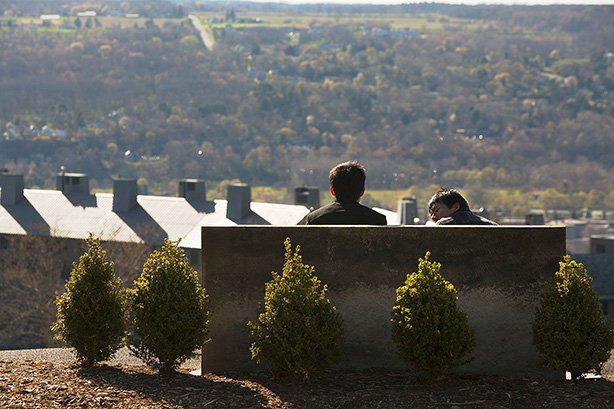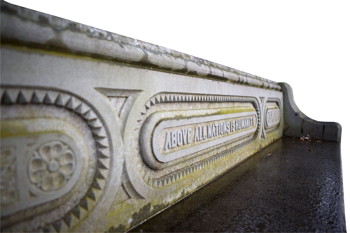CORNELL HISTORY

Two people relax on the "Our fair Cornell" bench behind Uris Library.
Resting on wisdom: Campus benches
When you stroll across Cornell's picturesque Ithaca campus, you will inevitably encounter historical markers, plaques and inscriptions. Thanks to the generosity and thoughtfulness of past Cornellians, The Hill abounds with reminders of the generations who walked these paths before us. For students looking to rest their feet (or minds) from the academic grind, a few well-placed stone benches have provided respite to the weary. And, in some cases, the words inscribed on these seats offer their own wisdom to those who might sit there.
'Above all nations'
In front of Goldwin Smith Hall, on the east side of the Arts Quad, sits perhaps the oldest bench on Cornell's campus. Given by Professor Goldwin Smith in 1871, the ornately carved bench predates much of the Arts Quad itself. The bench's inscription, "Above All Nations Is Humanity," is said to have originated with Smith and has been adopted by institutions around the globe. The same phrase appears on benches at the University of Hawaii (the phrase is the school's motto) and Bogazici University in Istanbul, Turkey. An exact replica of Cornell's bench can be found at Duke University, given in 1946 by Cornellian Charles A. Ellwood, Class of 1896, who taught sociology at Duke from 1930 to 1944.
'Sympathy and greeting'
Numerous benches sit atop Libe Slope, where they overlook West Campus and take advantage of one of the best views on campus. A favorite of many Cornellians is the bench given by Andrew Dickson White and his wife, Helen Magill White, in 1892. The couple would often walk from their home at the A.D. White House down to the Cornell University Library and slope on a tree-lined path, which became known as President's Avenue. The bench's inscription reads:

Detail of the "Above all nations" bench in front of Goldwin Smith Hall. See larger image
To those who shall sit here rejoicing,
To those who shall sit here mourning,
Sympathy and greeting;
So have we done in our time.
1892 A.D.W.–H.M.W.
The bench's statement of the shared commonality of life's joys and sorrows continues to resonate with Cornellians today. It was borrowed for a wooden bench in the Cornell Plantations, given in 1987 by the Class of 1922 (although mistakenly changing Helen White's initials to "R.M.W."), and it even appears in a 1921 novel by Cornellian author Elsie Singmaster, Class of 1902.
'Our fair Cornell' and more
To the north and south of the A.D. White bench are two more modern benches that convey the deep devotion felt by Cornellians for their alma mater. Behind McGraw Hall is a limestone and granite bench given by Jim Vlock '47 in 2002 in honor of his late wife, Laurel Fox Vlock '48. The inscription, etched into a strip of black granite on the seat, expresses a sentiment that holds true for countless alumni: "Cornell was a time and place that changed our lives. May it be for others as it was for us." Laurel Vlock, an Emmy Award-winning producer and filmmaker, was instrumental in co-founding the Holocaust Survivors Film Project to record and compile interviews with survivors.
The third in the trio of benches overlooking the slope sits near Uris Library and was given by the Class of 1927. The simple stone bench offers a simple statement, borrowed from the Cornell "Evening Song":
"Love to Thee Our Fair Cornell."
Corey Ryan Earle '07 is associate director of student programs in Cornell's Office of Alumni Affairs.
Related video: "The Bench" on Vimeo by students Lindsay Rothfeld, Jamie Lewis and Michelle Varghese.